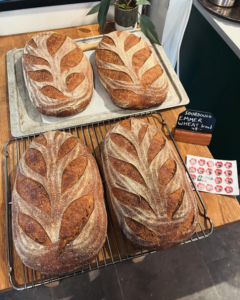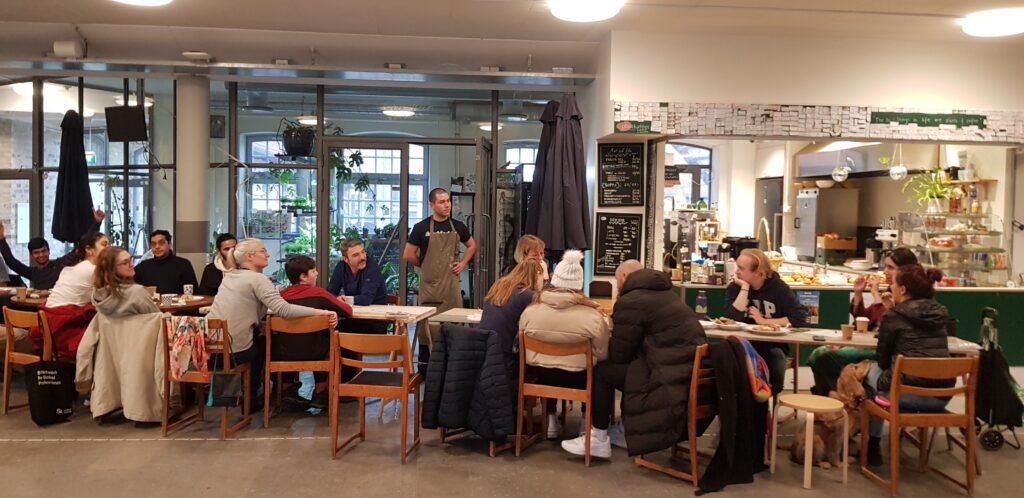The Story of Success highlights innovative regional companies in Plant and Food science which are bridging the gap between research and industry. In this interview, Tomás Castro, the founder and baker at Amapola and an MSc student at SLU Alnarp, introduces an innovative, organic micro-bakery that utilises local Skåne products. What ingredients does Amapola employ, and where can you buy their wonderful goods? What prompted the bakery’s creation? Read the interview below!
Please briefly introduce your company.
Amapola is a local, organic, and sourdough-based micro-bakery. We produce affordable, high-quality pastries and sourdough bread using local organic ingredients to engage SLU students and staff with the local agroecological landscape of southern Sweden by incorporating a traditional bread-making practice and enhancing the sustainable consumption of food in Alnarp.
What was your motivation for starting the company?
I wanted to revolutionize how people experience and engage with food in the service sector. While studying and living here at SLU Alnarp, I noticed that most students relied on store-bought bread and pastries. Furthermore, the café on campus relied on ready-made frozen pastries for daily sales. I thought this was rather contradictory, especially here at the Swedish Agricultural University, where there are many natural ties with local farmers. The potential to source diverse, fresh, and local ingredients from local farms to supply students and staff with amazing baked goods was a no-brainer.
Can you tell us more about the ingredients and technologies you use?

Fresh-baked sourdough breads are available daily at Amapola!
The technologies I use can be described as rather (intentionally) primitive. I work with a medium-sized stone oven and a small mixer. I rely on a traditional bread-making process using sourdough starter and poolish in most baked goods to leaven the dough and enhance its flavour. All breads are shaped by hand, and all the pastries are made in-house. Initially, this was a very heavy burden when I started alone, but now that I have a partner, we aim to make most (if not all) of the products ourselves and rely on raw ingredients as much as possible. The aim is not to reinvent the wheel but rather to remind people what good quality, local and affordable products can taste like if time and effort are invested.
Finding local farms to source our ingredients has been quite difficult, and it is still an ongoing process. We are aiming to source more than ⅔ of our ingredients from local products by this summer. The flour we use is currently sourced from Värpinge Grön, a local agroecological farm in the western periphery of Lund. They produce high-quality organic heirloom wheat varieties (Dala, Einkorn, Emmer, Spelt), as well as rye. They produce their own flour and grains at a stone mill directly on the farm. This allows the bakery to get freshly-milled flour every month or so. In addition, we are establishing stronger ties to Alnarp’s Agroecology farm in order to source fresh & seasonal ingredients for seasonal summer pastries and bread. Furthermore, all our dairy (butter, milk, and cream) is from organic Skånemejerier dairy farms. Lastly, for products that have to be sourced from abroad, we buy from a German import company (Bode Naturkost) that deals only with organic raw ingredients. This is where we buy our Ceylon & cassia cinnamon, cardamom, chocolate, and some seeds and nuts (although we will soon be sourcing nuts from Skåne!).
It has been a long but very inspiring journey. I have made a lot of mistakes along the way, but it has been amazing to meet many interesting people who are engaged in the world of food, from production to consumption. After all, they are the ones that make stories like these possible since I believe it is important to acknowledge that the agricultural landscape is an extension of the kitchen––and it deserves to be valued as such!
What makes you different from other companies in your sector? What novelty do you bring?

Amapola sells both savoury and sweet goods!
The bakery was established as a pillar of sustainability. From the very start, I was eager to prove whether it was possible to manage and sustain a small bakery that relied only on organic and/or local ingredients. I want to present organic and local products as accessible to the general public, which, sadly, these days is almost a revolutionary act. There are many restaurants, bakeries and cafés that aim to be more selective with their ingredients due to the immense environmental, social, and economic consequences that conventional agriculture creates. However, their prices are often too high for most people to afford. The innovative and simple aspect of Amapola is being able to depend only on local and organic ingredients while keeping prices affordable*. We are able to do this by doing all the work ourselves while keeping the labour force small (we are currently two people working at the bakery), which then allows us to invest more in very high-quality ingredients. Furthermore, the set-up investment was kept relatively low compared with medium- or large-sized bakeries.
*At the same price as similar products that use conventional ingredients.
What type of market do you target?
I aim to prove that healthy, local, and organic food should not be gentrified. I would like to engage everyone who enjoys eating bread and delicious pastries to be part of this small community. Micro-businesses like Amapola can maintain prices affordable by preparing everything in-house and keeping the workforce small. I want to present an alternative model to large restaurant chains that sacrifice quality only to maximize profit. A new model of food businesses that prioritize quality, taste, freshness, and seasonality must emerge to counter the dominant and over-powering stature of highly processed foods. Food businesses must maintain high values, as they are direct bridges between people and the agricultural landscape. It is, therefore, their responsibility to understand and know their food’s impact (whether positive or not) on the environment, as well as the socio-economic background of the people who are producing it.
Where are you now, and where will your company be in 5 and 15 years?
I want to be able to move forward to other products that I have been interested in – primarily fermented products, such as kombucha, kefir, cheese, sauerkraut, and kimchi, among others. I want to create a community of like-minded entrepreneurs who see the importance of food businesses as indispensable actors for change to support sustainable consumption and production.

Come to Plantkafeet in Alnarp to taste the wonderful products of Amapola Bageri!
Thank you for a very interesting interview, Tomás! We wish you and Amapola Bageri all the best in future endeavours!
(Photo: Tomás Castro, Amapola Bageri Instragram)

